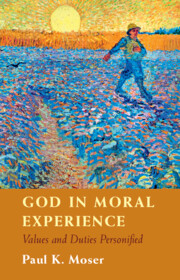3 results

God in Moral Experience
- Values and Duties Personified
-
- Published online:
- 09 November 2023
- Print publication:
- 23 November 2023
12 - Emotion and Affect
- from Part II - Aspects of Ethical Agency
-
-
- Book:
- The Cambridge Handbook for the Anthropology of Ethics
- Published online:
- 11 May 2023
- Print publication:
- 25 May 2023, pp 309-334
-
- Chapter
- Export citation
Moral Experience of Canadian Healthcare Professionals in Humanitarian Work
-
- Journal:
- Prehospital and Disaster Medicine / Volume 24 / Issue 6 / December 2009
- Published online by Cambridge University Press:
- 28 June 2012, pp. 518-524
- Print publication:
- December 2009
-
- Article
- Export citation

